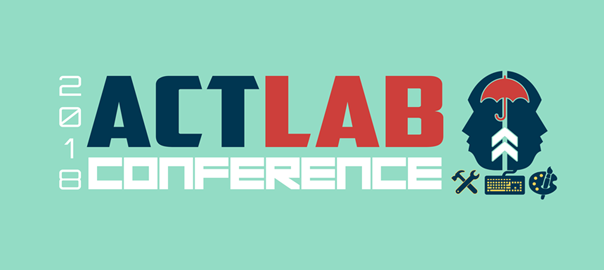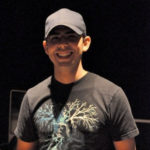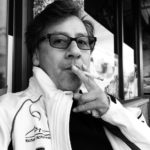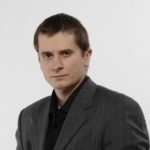In alphabetical order:
Presentation Title: The Technological Constraints of Storytelling in More than One Direction
Abstract: Starting with a brief history of filmmaking and mid-century sci-fi stories, present the evolution of “virtual reality” technology, present-day 360-camera rigs, innovative light field cameras, head-mounted displays, and touch on the post-processing of stitching and codecs.
In an open-ended fashion, deconstruct what it means to be part of the cast and crew of 360-endeavors. Focus on how perspective, emotional response, and post-production will be key to building the next masterpiece.
The 122-slide presentation consists of 3 sections: No Fate, But What We Make, and For Ourselves, which coincide with the Past, Present, and Future of visually immersive cinema. The slides, presented once at the 2016 La Frontera Film Festival in just under an hour, consist heavily of major motion picture video clips and necessary illustrative photos and diagrams, with most text restricted to title cards and slide titles.
Video Abstract: https://youtu.be/chgTHM7fmcA
Short Bio: Joaquin Casares has a BA in Computer Science and a BS in Radio-Television-Film, a bit backwards we must admit. His day job for the past 7 years after becoming an ACTLab alum has revolved around big data distributed databases. However, he has continued to make the time to attend 11 Austin Film Festivals in a row and watch far more than 52 movies a year. One day he will perhaps create his own film, but until then, he continues to be an avid movie buff while collecting scenes and attributes of existing media for his own future project(s).
Title: Collective Intelligence Subject: The 1492 Law
Abstract: 1492 Law encompasses the uniting of Common citizens whom through Social Media, Geolocation footprints, DNA, Face Recon and big Data will become the Witness, Esquire, Jury and Judge to convict each other of a Crime.
The 1492 Law is on the horizon in the American society to be presented and passed by different states and eventually on a Federal level.
Unlike Minority Report, Law enforcement is not working on premonition of thoughts through Social Media based on Algorithms to determine future crime.
1492 allows the Common citizen to use their collection of multiple digital sources to make a Legal Charge against their fellow citizen.
In part, this collection of Real-time to Post time evidence is provided to Open Social Media pages within the county, state or federal level for other citizens to exam, vote/judge and convict the person or persons in question to the crime presented.
Unethical, Unjust, Untruthful? All these questions and more have already been answered in 2018, let us see if 2020 begins to usher in the beginning of 1492 the New World discovery of Citizen jury and judge.
Bio:
Title: Electronica Music
Abstract: Proposing to play a piece on home-made electronic music equipment, give a talk about how it works and why and how it’s built (analog circuitry, MAX, Teensy). Can expand this into talk about the ongoing modular / analog synthesis renaissance – the alt-culture reaction to EDM.
Doing a presentation / performance this Saturday (today) locally (working on a second device) – will attempt to get some video of it.
Bio: Knut is a German software designer, currently running the product design team at Tethr.
Title: Image Fulgurator
Abstract: Fulgore is my constructed take on the idea of an image fulgurator. It is essentially a camera that works backwards, projecting light into a scene through a lens rather than capturing it. It could certainly be used subversively, to incept content into someone else’s photo, but I have instead mostly focused on trying to make the Fulgore a flexible and useful addition to a photographic arsenal.
Bio: Brian is a professional stuff maker based out of Austin, TX. Primarily working in photography, he also produces video, plays multiple instruments, bakes bread, took 9 ACTLAB courses at the University of Texas, and was a cinematic designer for Star Wars: The Old Republic.
Title: An introspective into cyborg identity, rights, and pride.
Abstract: An autobiographical reflection on all things human and post human.
Bio: Founder of Borgfest, a festival to celebrate and support people interested in human augmentation, enhancement, body mod, and wearable tech. www.borgfest.com
Title: What Can We Learn From Using Intelligence Location? A Concert Industry Mapping Framework For The City of San Antonio
Abstract: The live music is an ever-evolving sector. It represents the core of the activities generating revenue for many musicians, an incubator for assessing audience tastes, and a cultural staple for each community. Because of the significance of the span of this industry many cities around the world have committed resources to conduct and reveal the value and impact of their live music sector. Assessing an impact study for the live music economy has been the focus of consulting groups such as Music Canada and funding partners, cultural, economic development councils, and guilds in cities, states or countries. However, mapping the scale and scope of a musical landscape and related businesses is rarely if ever conducted as part of such studies. Thus, the author provides a mapping framework contributing to the academic literature and presents a new option for organizations and focus groups dedicated to assessing the impact of the ever-growing live music sector and industry. Intelligence location, which is also known as geographic information system (GIS) is used here to capture, store, manipulate, analyze, manage, and present music-centric geographic data for the City of San Antonio.
Bio: Dr. Stan Renard is the Assistant Professor and Coordinator of the Music Marketing Program in the Music Department at the University of Texas at San Antonio (UTSA). Dr. Renard joined UTSA as part of the University’s Goldstar Initiative, which supports its recruitment and retention of world-class faculty members. He has the unique background of someone who has taught business courses in business schools and music courses in music departments, and then used this experience to develop music business courses. Dr. Renard is an Assistant Director of the start-up incubator CITE (Center of Innovation, Technology and Entrepreneurship). He is also a touring and recording artist, virtuoso violinist, violist, active conductor, and the founder and arranger of the Grammy-Nominated Bohemian Quartet. Dr. Renard holds a Doctorate in Musical Arts (DMA) from the University of Connecticut as well as a Doctorate in International Business (DBA) from Southern New Hampshire University. Previously held collegiate appointments include Colby College, the University of Massachusetts, Amherst, the University of Connecticut, Providence College, Eastern Connecticut State University, Southern New Hampshire University, and the University of California at San Diego.
Title: Humans Teaching Robots Teaching Humans How To Ride Bikes
Abstract: Using Data and Machine Learning A.I. to Grow Bike-Friendly Communities and
Help Cities Achieve Economic, Environmental, and Public Health Goals.
Although over 100 Million Americans ride a bicycle each year according to a study by
Breakaway Research Group for People for Bikes, less than 50% of those ride twice each
month and only about 14% ride twice each week. Low ridership in America is a cause for
concern given the challenges we face in regards to the environment, public health, and other
important issues that frequent bicycling can help to improve.
With smartphone technology, each person is a participant in generating massive amounts of information that can be analyzed and utilized by researchers, professionals, hobbyists,
activists, and anyone with access to the internet. Innovations in technology, geo-location
systems, data collection, machine learning, and artificial intelligence create new tools to help get more people on bikes more often which can transform our cities into cleaner, healthier, more prosperous places to live.
Together we will dive deeper into one of these new innovations, demonstrate its capabilities, and discuss how the 4th industrial revolution can help push us to be a bicycle-centric society.
Bio: Hi my name is Aaron Peña, I’m a tech entrepreneur, graphic designer, and web developer from San Antonio, Texas. I am actively involved in a project called VeloVue, a web and mobile application that creates personalized bike rides for bicyclists based on their interests and level of fitness to help people discover local businesses and events in their community by utilizing data and machine intelligence.
Title : How can Augmented Reality be applied today?
Description : With technologies like ARCore and ARkit, Augmented Reality is more accessible than ever. I will demonstrate the practical use cases of AR in today’s world rather than how it is promised to be in 10 years.
Bio : I am an Augmented Reality and Virtual Reality software engineer getting a startup off the ground. I started programming in 8th grade with game development. Practicing game development for 5 years led me into the AR/VR space after a partner of mine suggested to use my knowledge of game development and apply it to virtual tours of the interiors of buildings. Since then I have been sharpening my skills just for AR/VR and the coming paradigm shift of media.
Video of my demos : https://www.youtube.com/watch?v=tTJ9Pk_uifA
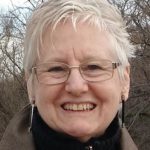 Presenter: Honoria Starbuck PhD
Presenter: Honoria Starbuck PhD
Title: Drawing Conclusions: SXSW Sketchbooks
Abstract: MAKE STUFF is the call-to- action of the ACTLab. When we attend a conference we sit in the audience and listen to stories. The stuff of conferences is speakers and listeners. Stories fly off the stage and wander around in afterparties. Conference stories encourage new ideas, new acquaintances, and end in collections of business cards. Artist Honoria Starbuck creates visual art at conferences. She draws from the inspiration of contemporary thinkers who have risen to the ranks of speakers. She derives portraits, plays with the shapes, fonts, and colors of ideas and records the conference as pages of drawings. Drawing Conclusions is the story of Honoria’s attendance at SXSW EDU and SXSW Interactive conferences in Austin as recorded in digital sketches. Drawing Conclusions is a curated collection of the SXSW work and the artist’s reflections on creating portraits of a conference.
Bio: Honoria Starbuck, Ph.D.
Visual communication and creative thinking are Honoria Starbuck’s strengths. Her inspiration flows from the history of art beginning with prehistoric cave paintings to contemporary life. In her drawings, prints, and paintings she explores color, shape, story, and the infinite ways in which art supplies can interact.
Internationally, Starbuck regularly contributes artworks to mail art shows. Mail art has been a dynamic international art movement for 60
years. Starbuck has been in the Mail Art Network since 1989 writing her doctoral dissertation on the effects of the Internet on the Mail Art Network.
Locally, Starbuck is a professor at the Art Institute of Austin guiding students toward dynamic visual communication in future careers in game design and animation. Starbuck use of digital drawing tools includes fashion illustration and sketchnote Live Art Blogging of conferences and meetings. Starbuck serves on the Advisory Boards of SXSWedu, SXSW Interactive, and Spellerberg Projects. Starbuck’s work is published on Saatchiart.com, honoriastarbuck.com, Facebook, Twitter and Starbuck’s 17-year blog at honoriartist.livejournal.com.
